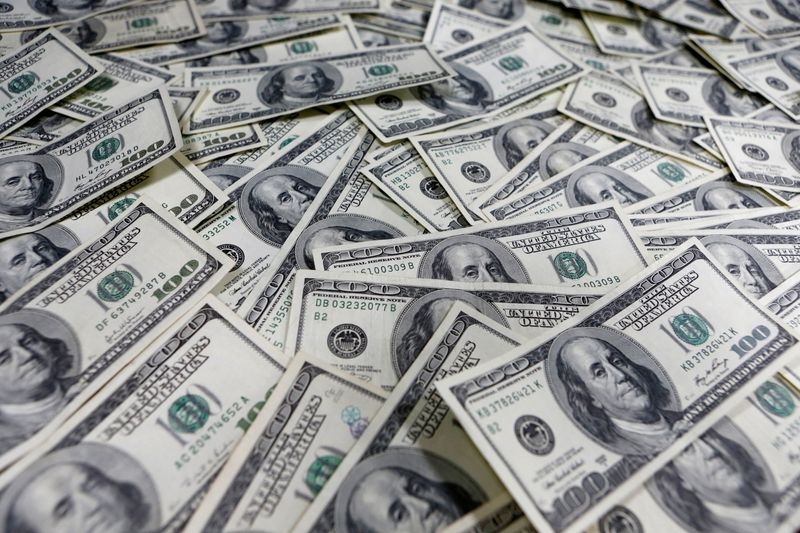Russia's invasion of Ukraine has disrupted economies and markets around the world, from energy and food prices to European banks, emerging market stocks and the Russian currency.
Below are five charts that show how Europe's biggest conflict since World War Two has shaped global financial markets in the last 12 months.
1/THE SAFEST OF SAFE HAVENS
There are many reasons why king dollar reigned supreme in the past year and one is its status as the ultimate safe haven at times of uncertainty. The economic fallout of the war, which hit currencies such as the euro hard, also lifted the dollar.
The greenback is down from September's two-decade highs, but it's still up 8% against a basket of currencies since the conflict began.
The impact on other safe havens such as governments bonds is complicated, however. Yes, U.S. and European bond prices rose in the days following Russia's invasion as investors sought safety in top quality assets.
But they soon fell and yields soared as the war triggered an energy shock and inflation surged, while central banks responded with aggressive rate hikes. Germany's 10-year Bund yield has risen to 2.4% from just 0.2% on Feb. 23, 2022.
Graphic: No knocking the dollar's safe-haven crown https://www.reuters.com/graphics/UKRAINE-ANNIVERSARY/xmvjknkdqpr/chart.png
2/THE STING IN THE PIPELINE
The war in Ukraine brought with it an energy crisis like no other. Post-COVID-19 reopening had already sent prices for anything from oil to coal to natural gas higher. But when Russian tanks rolled into Ukraine in late February, European natural gas prices rocketed by almost 400% in two weeks. By August, they were 700% higher than a year earlier.
Pre-war, Russia supplied over 30% of Europe's gas, most of it through a network of pipelines, thousands of kilometres long. Once Western sanctions hit, the flows of gas dried up. Energy prices soared, bringing the threat of blackouts, recession and a worrying switch back to dirtier sources of fuel.
Thankfully, winter has proven mild and Europe has found other suppliers, bringing the gas price back to around 50 MWh, its lowest since August 2021. But, there's a lag of around 6-9 months between what happens on the wholesale market and what happens to consumers' bills, meaning last August's punishing spike to almost 350 MWh - equivalent to an oil price of over $200 a barrel - hasn't even begun to bite.
Graphic: Europe's gas price rollercoaster https://www.reuters.com/graphics/UKRAINE-ANNIVERSARY/xmpjknkmqvr/chart.png
3/PRECIOUS FOOD
Food prices, which were already on a tear in 2021 after COVID-19, leaped again after Russia's invasion of Ukraine on fears of shortages and disruptions to Black Sea trade.
Last year the U.N. food agency's average price index hit its highest level on record, up 14.3% from the previous year. The index had already gained 28% in 2021.
Higher energy and input costs, adverse weather and continued strong global food demand are adding to pressure from significant market disruptions. Over the whole of 2022, four of the five food sub-indexes - cereals, meat, dairy and vegetable oils - reached record highs.
Food price pressures are easing, but that does little to soften the blow for many developing nations, where food and energy prices make up a larger share of spending. Shocks related to the COVID-19 pandemic and the war in Ukraine mean the world is unlikely to meet a longstanding goal of ending extreme poverty by 2030, the World Bank has warned.
Graphic: World food prices off highs https://www.reuters.com/graphics/UKRAINE-WAR/GLOBALECONOMY/zgvobkygjpd/chart.png
4/ ROUBLE TROUBLE
The past year has seen wild swings for Russia's currency - a more than 50% tumble following the invasion to record lows in March, followed by a more than 200% rise to a multi-year high in June thanks to soaring energy prices, FX restrictions and the central bank ramping up interest rates. Twelve months on, the rouble is broadly back to its pre-war 12-month average.
Russia wants a weaker rouble to boost hydrocarbon revenues, which is helping plug a widening budget deficit and soaring domestic spending due to the ballooning cost of the Ukraine war. But it is also attempting to shore up its finances by selling its foreign currency reserves, and started interventions for the first time in almost a year in January. Moscow burned through $38 billion of its rainy-day fund, the National Wealth Fund, in December alone to cover its deficit.
Fresh pressure on the currency could come from sanctions: EU members are expected to approve a 10th package around the anniversary.
Graphic: Rouble's troubles https://www.reuters.com/graphics/UKRAINE-ANNIVERSARY/jnvwyaydqvw/chart.png
5/TWO CAMPS FOR EU BANKS
European banks took a drubbing when Russia invaded Ukraine. Since then, those that have slashed links have outperformed and those that have not continue to see their shares take a hit.
Raiffeisen Bank International's shares suffered their worst daily drop since the onset of the war on Monday, as the Austrian lender drew the attention of U.S. sanctions officials over its Russian business. Shares of Raiffeisen, deeply embedded in Russia's financial system, have slumped over 40% since the start of 2022.
France's Societe Generale (OTC:SCGLY) sold its Russia business Rosbank in May, taking a 3 billion euro ($3.18 billion) hit. Italy's UniCredit cut its cross-border exposure to Russia by two thirds, but still owns one of Russia's top 15 lenders. It has pledged to cut its presence, which has reassured investors. SocGen and UniCredit shares have rebounded from the post-invasion hit.
Graphic: EU banks' Russian exposure concerns https://www.reuters.com/graphics/UKRAINE-ANNIVERSARY/dwvkdzdwjpm/chart.png
Click on the link to listen to the Reuters World News Podcast Special anniversary episode: The Ukraine war
($1 = 0.9446 euros)
Source : [One year of war in Europe: How the dollar, energy and food prices swirled](www.investing.com/news/economy/one-year-of-war-in-europe-how-the-dollar-energy-and-food-prices-swirled-3013417) by Reuters - Economy News by Reuters / February 24, 2023
